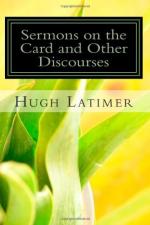For what a thing was that, that once every hundred year was brought forth in Rome of the children of this world, and with how much policy it was made, ye heard at Paul’s Cross in the beginning of the last parliament: how some brought forth canonizations, some expectations, some pluralities and unions, some tot-quots and dispensations, some pardons, and these of wonderful variety, some stationaries, some jubilaries, some pocularies for drinkers, some manuaries for handlers of relicks, some pedaries for pilgrims, some oscularies for kissers; some of them engendered one, some other such fetures, and every one in that he was delivered of, was excellent politic, wise; yea, so wise, that with their wisdom they had almost made all the world fools.
But yet they that begot and brought forth that our old ancient purgatory pick-purse; that that was swaged and cooled with a Franciscan’s cowl, put upon a dead man’s back, to the fourth part of his sins; that that was utterly to be spoiled, and of none other but of our most prudent lord Pope, and of him as oft as him listed; that satisfactory, that missal, that scalary: they, I say, that were the wise fathers and genitors of this purgatory, were in my mind the wisest of all their generation, and so far pass the children of light, and also the rest of their company, that they both are but fools, if ye compare them with these. It was a pleasant fiction, and from the beginning so profitable to the feigners of it, that almost, I dare boldly say, there hath been no emperor that hath gotten more by taxes and tallages of them that were alive, than these, the very and right-begotten sons of the world, got by dead men’s tributes and gifts. If there be some in England, that would this sweeting of the world to be with no less policy kept still than it was born and brought forth in Rome, who then can accuse Christ of lying? No, no; as it hath been ever true, so it shall be, that the children of the world be much wiser, not only in making their things, but




